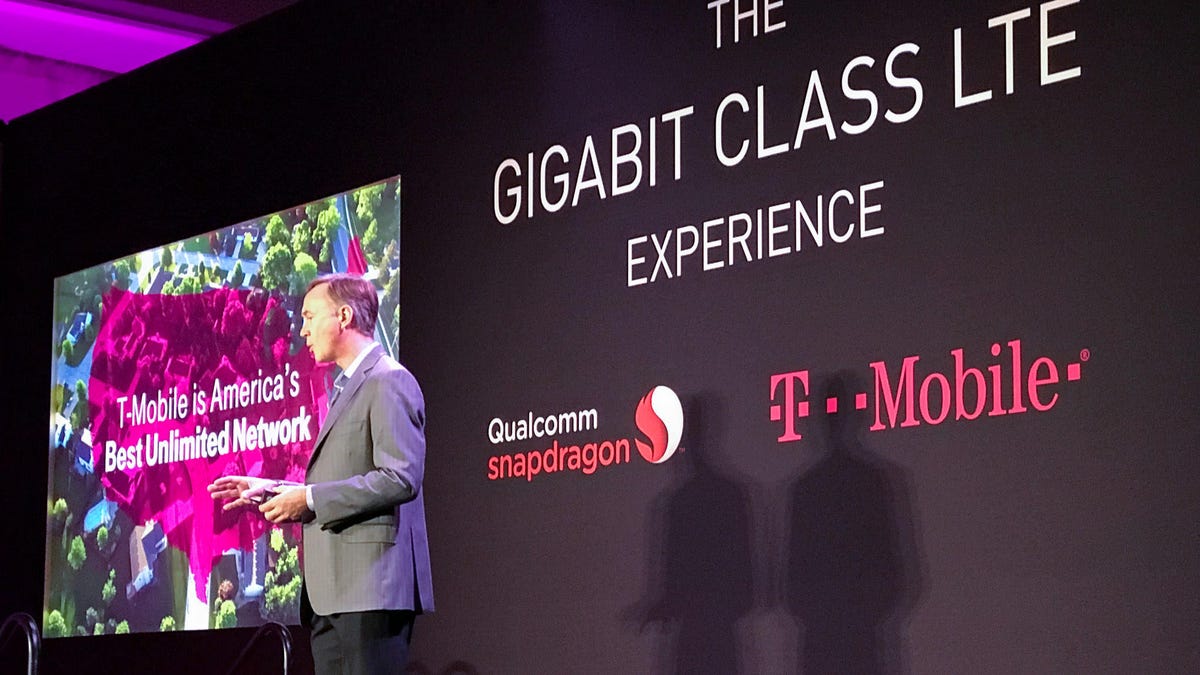T-Mobile's gigabit network push reaches 430 markets in US
The carrier boasts of "eclipsing" Verizon and AT&T with next-gen LTE technology. Nonsense, Verizon responds.

Mark McDiarmid, vice president of network engineering at T-Mobile, boasts of moving to faster gigabit LTE technology before AT&T and Verizon.
T-Mobile now offers 1-gigabit-per-second mobile networks in 430 markets, an expansion it hopes will help it woo subscribers away from Verizon and AT&T.
Today's mobile networks are powered by a technology called LTE (Long Term Evolution), and T-Mobile has brought an updated version called LTE Advanced to 920 US markets, it said at a press conference Thursday. In nearly half of those markets, T-Mobile has the equipment and radio airwaves available to offer an even faster version of gigabit download speeds.
One of those places is San Jose, California. At a press conference there, T-Mobile and Qualcomm , a phone processor and radio chips maker, demonstrated a download speed of 611 megabits per second, which the companies call "gigabit class" if not exactly 1Gbps.
With LTE Advanced, T-Mobile is "eclipsing every other national wireless company," T-Mobile said in a statement.
Verizon called T-Mobile's assertions "inaccurate." The company has LTE Advanced in nearly 2,000 markets with the underpinnings for gigabit LTE in 560 markets -- to T-Mobile's 430. "This is another example of T-Mobile's marketing getting ahead of the facts," spokesman Howie Waterman said.
T-Mobile said it based its assessment on Verizon's website, which says the company offers LTE Advanced in 450 markets.
AT&T offers LTE Advanced in two markets -- Austin, Texas and Indianapolis -- and will announce another new city next week as part of a plan to reach 20 cities by the end of the year, the company said. It's also begun testing gigabit LTE, with a San Francisco test reaching 979Mbps speeds this summer.
The unending progress in mobile networks is remarkable though you may not fully appreciate it. For one thing, networks might not feel faster because we're taxing them heavily with music, photos and videos that rapidly sponge up new capacity. For another, it takes a while for phones to support new network technology. And if you live somewhere far from a major population center, where new networks are a priority, bummer for you.
Today, only 10 phones have all the abilities needed for gigabit LTE, said Pete Lancia, a Qualcomm vice president of marketing. That includes Samsung's Galaxy S8 and Galaxy Note 8, the LG V30 and the HTC U11. But it doesn't include the Apple iPhone 8 or iPhone X.
T-Mobile shows that phones supporting gigabit-class LTE networks can reach data-transfer speeds of 685Mbps. In addition, slower phones benefit from the faster phones' presence as the faster phones free up radio airwaves sooner.
T-Mobile has been more aggressive than rivals and, through its "un-carrier" marketing campaign, has made progress winning us over. It has outgrown other US carriers for the last seven quarters when it comes to the important category of postpaid customers, those who pay bills at the end of the month. It's got 70 million customers today, said Mark McDiarmid, vice president of network engineering at T-Mobile.
"Verizon and AT&T have a bunch of legacy issues. T-Mobile is a bit more nimble," Endpoint Technology analyst Roger Kay said. He also said T-Mobile already invested in base station designs that are easier to update to the gigabit speeds.
LTE Advanced uses a number of tricks to pump bits faster over the airwaves. Among those tricks is what's called carrier aggregation, which lets phones use multiple radio communication channels at the same time. Today that happens over a radio spectrum that carriers license from governments, but another trick taps into an unlicensed spectrum, notably the 5GHz frequency band that many Wi-Fi routers use.
"Gigabit-class" speeds don't exactly mean gigabit speeds, though. T-Mobile's lab tests have reached 900Mbps, but the top speed in the real world is closer to 800Mbps. Demos at the press conference showed devices reaching speeds of 685Mbps.
LTE Advanced is able to use radio waves more efficiently. That means even if you don't have a phone that can handle the new speeds, you might benefit. That's because people who do have the faster phones will grab their data and get out of the way sooner.
First published Nov. 9, 10:57 a.m. PT.
Update, 12:00 p.m. PT: Adds further detail about LTE Advanced.
Update, 2:22 p.m. PT: Adds comment from AT&T.
Update, 3:44 p.m. PT: Adds comment from Verizon.
Update, Nov. 12 at 8:25 p.m. PT: Adds response from T-Mobile.
The Smartest Stuff: Innovators are thinking up new ways to make you, and the things around you, smarter.
'Alexa, be more human': Inside Amazon's effort to make its voice assistant smarter, chattier and more like you.

